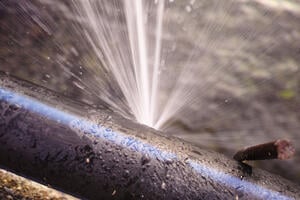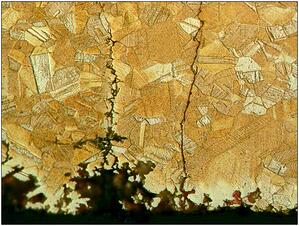IMR Materials Testing Technical Blog
Failure Testing and Analysis of Cracked DI Water Pipe
One of the main goals in determining the root cause of product failures is preventing future recurrences. The problems are not always obvious, so having an open mind during the analytical process helps testing professionals utilize a multi-disciplinary approach.
Our customer reached out to IMR Test Labs to perform a thorough Failure Analysis. They discovered a pipe that carried de-ionized (DI) water had cracked for unknown reasons. The piping system was an integral part of our customer’s manufacturing process, so getting to the root cause was extremely important to prevent down-time on the factory floor. After extensive discussions with our failure analysis team, a testing protocol was established utilizing our metallurgical and chemical analysis labs.

Here’s an overview of the process: Two sections of 304 stainless steel pipe were received for analysis of the source of leaks. Additional materials were also received, including insulation, strapping, two process fluids and a water sample from the DI system used to mix the fluids. One pipe showed minor pitting and the other contained a network of fine cracks.
The cracks appear to have originated on the outside of the pipe. Both pipes were covered with debris. Drops of the process fluids and the DI water were dried on aluminum stubs.

The DI water contained numerous sodium chloride deposits. Ion chromatography (IC) testing confirmed that the DI water sample contained 9 ppm of chlorides. This is the likely source of chlorides that caused the corrosion.
The other dried process fluids, debris, pieces of the supplied insulation and strap material were analyzed using scanning electron microscope with energy dispersive spectroscopy (SEM/EDS) equipped with a light element detector. None of these materials contained any chlorine.
The debris on the surfaces of the tubes was from the silica-based insulation and contained sodium and chlorine, likely from trapping moisture against the pipes. 300 series stainless steels are susceptible to stress corrosion cracking (SCC) in moist chloride environments.
The customer was able to make adjustments in their manufacturing process to mitigate this problem, and prevent recurrence.
Have questions about failure analysis? Email us and let’s discuss.


